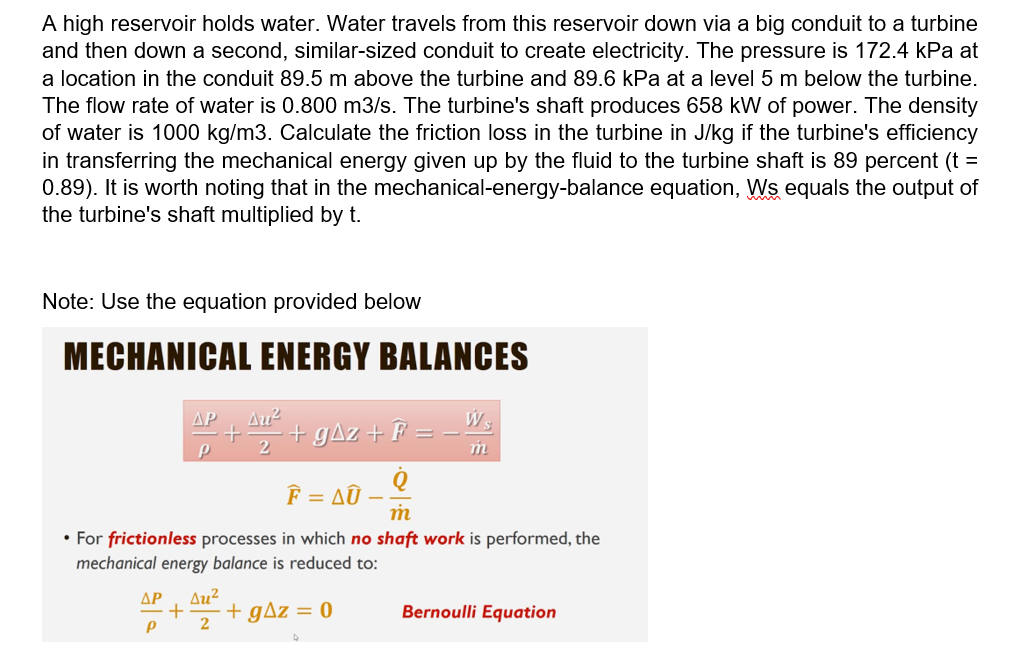A high reservoir holds water. Water travels from this reservoir down via a big conduit to a turbine and then down a second, similar-sized conduit to create electricity. The pressure is 172.4 kPa at a location in the conduit 89.5 m above the turbine and 89.6 kPa at a level 5 m below the turbine. The flow rate of water is 0.800 m3/s. The turbine's shaft produces 658 kW of power. The density of water is 1000 kg/m3. Calculate the friction loss in the turbine in J/kg if the turbine's efficiency in transferring the mechanical energy given up by the fluid to the turbine shaft is 89 percent (t = 0.89). It is worth noting that in the mechanical-energy-balance equation, Ws equals the output of the turbine's shaft multiplied by t.
A high reservoir holds water. Water travels from this reservoir down via a big conduit to a turbine and then down a second, similar-sized conduit to create electricity. The pressure is 172.4 kPa at a location in the conduit 89.5 m above the turbine and 89.6 kPa at a level 5 m below the turbine. The flow rate of water is 0.800 m3/s. The turbine's shaft produces 658 kW of power. The density of water is 1000 kg/m3. Calculate the friction loss in the turbine in J/kg if the turbine's efficiency in transferring the mechanical energy given up by the fluid to the turbine shaft is 89 percent (t = 0.89). It is worth noting that in the mechanical-energy-balance equation, Ws equals the output of the turbine's shaft multiplied by t.
Elements Of Electromagnetics
7th Edition
ISBN:9780190698614
Author:Sadiku, Matthew N. O.
Publisher:Sadiku, Matthew N. O.
ChapterMA: Math Assessment
Section: Chapter Questions
Problem 1.1MA
Related questions
Question

Transcribed Image Text:A high reservoir holds water. Water travels from this reservoir down via a big conduit to a turbine
and then down a second, similar-sized conduit to create electricity. The pressure is 172.4 kPa at
a location in the conduit 89.5 m above the turbine and 89.6 kPa at a level 5 m below the turbine.
The flow rate of water is 0.800 m3/s. The turbine's shaft produces 658 kW of power. The density
of water is 1000 kg/m3. Calculate the friction loss in the turbine in J/kg if the turbine's efficiency
in transferring the mechanical energy given up by the fluid to the turbine shaft is 89 percent (t =
0.89). It is worth noting that in the mechanical-energy-balance equation, Ws equals the output of
the turbine's shaft multiplied by t.
Note: Use the equation provided below
MECHANICAL ENERGY BALANCES
W s
+ gAz + F =
AP
F = AÛ
• For frictionless processes in which no shaft work is performed, the
mechanical energy balance is reduced to:
ΔΡ
Au²
gAz = 0
Bernoulli Equation
Expert Solution
This question has been solved!
Explore an expertly crafted, step-by-step solution for a thorough understanding of key concepts.
Step by step
Solved in 2 steps with 2 images

Knowledge Booster
Learn more about
Need a deep-dive on the concept behind this application? Look no further. Learn more about this topic, mechanical-engineering and related others by exploring similar questions and additional content below.Recommended textbooks for you

Elements Of Electromagnetics
Mechanical Engineering
ISBN:
9780190698614
Author:
Sadiku, Matthew N. O.
Publisher:
Oxford University Press

Mechanics of Materials (10th Edition)
Mechanical Engineering
ISBN:
9780134319650
Author:
Russell C. Hibbeler
Publisher:
PEARSON

Thermodynamics: An Engineering Approach
Mechanical Engineering
ISBN:
9781259822674
Author:
Yunus A. Cengel Dr., Michael A. Boles
Publisher:
McGraw-Hill Education

Elements Of Electromagnetics
Mechanical Engineering
ISBN:
9780190698614
Author:
Sadiku, Matthew N. O.
Publisher:
Oxford University Press

Mechanics of Materials (10th Edition)
Mechanical Engineering
ISBN:
9780134319650
Author:
Russell C. Hibbeler
Publisher:
PEARSON

Thermodynamics: An Engineering Approach
Mechanical Engineering
ISBN:
9781259822674
Author:
Yunus A. Cengel Dr., Michael A. Boles
Publisher:
McGraw-Hill Education

Control Systems Engineering
Mechanical Engineering
ISBN:
9781118170519
Author:
Norman S. Nise
Publisher:
WILEY

Mechanics of Materials (MindTap Course List)
Mechanical Engineering
ISBN:
9781337093347
Author:
Barry J. Goodno, James M. Gere
Publisher:
Cengage Learning

Engineering Mechanics: Statics
Mechanical Engineering
ISBN:
9781118807330
Author:
James L. Meriam, L. G. Kraige, J. N. Bolton
Publisher:
WILEY